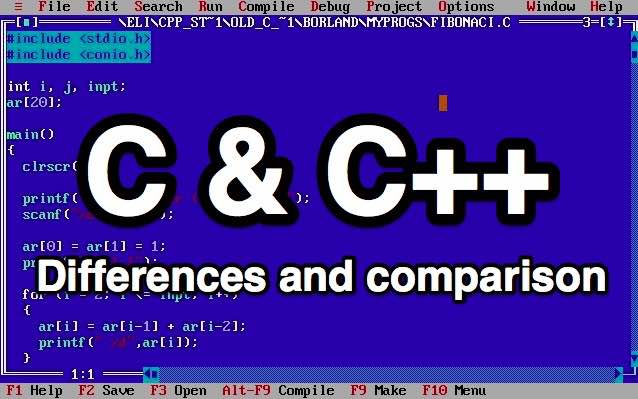C And C++ Programming Languages — Biggest Differences And Comparison

 Short Bytes: C vs C++ — which one is better? What is a procedural programming language and what is a modular programming language? Which one should be used for better and faster output? Well, we answer all the aspects of using C vs C++ against each other in this article.
Short Bytes: C vs C++ — which one is better? What is a procedural programming language and what is a modular programming language? Which one should be used for better and faster output? Well, we answer all the aspects of using C vs C++ against each other in this article.
Let's take a deeper look into the same and know why and how these languages are different.
C vs C++: Comparison and differences
Structural or procedural
C is a structural or procedural programming language whereas C++ is a modular or an object-oriented programming language.
Let's look at it this way:
Let's imagine, you are building up a house in the archaic times. So you do not define the placement, size, and configuration of the bricks, windows, and the door.
Time flew by and in the modern era, you again decided to build up a house but this time, you defined everything and in fact, you even had a plan of your house.
So, the first style of building up a house was procedural. That means, you just had resources and you utilized them but in the later case, you decided everything before hand that means you modularized the construction.
Now replace the bricks of the house with the bytes and you would know what I was talking about. Thus, this is the major difference between C vs C++.
Use of Virtual functions
No virtual functions are present in C but C++ uses them.
Information hiding support in C++
C does not support information hiding. That means, when a data is defined in C, it becomes a free entity and can be easily manipulated by outside code. In C++, Encapsulation hides the data to ensure that data structures and operators are used as intended.
Get Best C and C++ Courses Here
Encapsulation
Encapsulation makes mapping easier in C++ to map data and functions whereas in C it becomes very complicated. C++ uses objects for the same purpose.
Programming approach in C and C++
C follows the top-down approach whereas C++ follows the bottom-up approach (remember an object in C++?)
Memory Allocation
C provides malloc() and Calloc() functions for dynamic memory allocation, and free() for memory de-allocation. C++ provides 'new' operator for memory allocation and free operator for memory de-allocation.
Function and operator overloading
C does not support function overloading and operator overloading whereas C++ supports function overloading and operator overloading.
That means, in C++, one function of the same name can be used in the different scopes. Overloaded functions enable programmers to supply different semantics for a function, depending on the types and number of arguments.
Inheritance
Inheritance is not possible in C but it is possible in C++.
Variable declaration in C and C++
In C programming language, you have to declare a variable at the beginning whereas in C++ a variable can be declared instantly anywhere throughout the program.
C vs C++: Input and Output compared
C uses functions for input/output. For example, scanf and printf. On the other hand, C++ uses objects for input-output. For example, cin and cout.
Namespace feature
To avoid collisions, C++ uses NAMESPACE. C has no such feature.
Let's see it this way. Two students in the same university cannot have the same roll number while two students in different universities might have the same roll number. The universities are two different namespace and hence contain the same roll number (identifier) but the same university (one namespace) cannot have two students with the same roll number (identifier).
Also read: Best Places to Learn C and C++ Programming Languages
Error Handling in C and C++
C does not provide direct support for error handling (also called exception handling) whereas C++ provides support for exception handling.
C vs C++ speed comparison
Asking the question about the speed of C and C++ is quite biased. C and C++ programming languages are nearly the same when it comes to their performance, given the condition that you are a skilled programmer.
If you code some C statement and them compile them under C++, they'll run just the same and generate the same machine code. However, C++ is developed as a superset to C and additional code is generated to support the higher level features.
The performance and speed of C and C++ mainly depends upon the decisions a C++ programmer makes. If one person makes a program that relies heavily on the high level tools of C++, the program might appear bloated. However, if one is skilled enough, a programmer can code a C++ program without calling bloated C++ libraries and acheive same level of performance.
Influences of C and C++ on other languages
C has influenced technologies like awk, csh, C++, BitC, Java, JavaScript, C#, D, Objective-C, Concurrent-C Limbo, Perl, and PHP.
On the other hand, C++ has influenced C#, D, Aikido, PHP, Java, and ADA 95.






